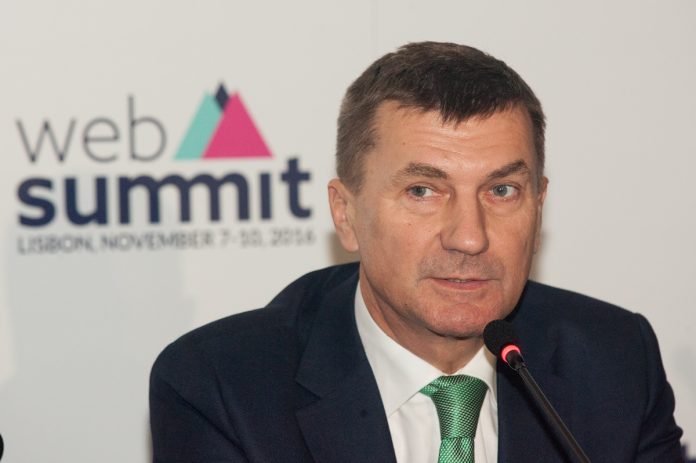Businesses and consumers will benefit from the completion of the Digital Single Market, says European Commission Vice-President Andrus Ansip
The Digital Single Market is the key digital strategy from the European Commission. Adopted in 2015, it has 16 key initiatives to be delivered by the end of 2016. The European Commission believes that completing the Digital Single Market could contribute €415 billion to Europe’s economy each year.
As one of the main proponents of the Digital Single Market Andrus Ansip, Vice-President of the European Commission spoke to Editor Laura Evans at the Web Summit in Lisbon in earlier this month. He addressed key challenges of the Digital Single Market and how it will benefit both consumers and business.
“2016 in particular, was the year in which 16 proposals were to be delivered and concluded. The decision making process for the Digital Single Market will take some time, but I hope that 2017 will be a really good year for European citizens. At first, we hope to abolish roaming surcharges, and we aim to do that by June 2017. This is to ensure people are able to use their mobile phone abroad much more and don’t have to pay unnecessary surcharges.
“Thanks to our portability proposal, people will have access to their digital content if they are currently within a member state. I hope that next year we will be able to abolish unjustified geo-blocking. I am mainly talking about visual content and it will take time, but we have to abolish unjustified geo-blocking. All the people here in this room, I expect experience some sort of unjustified geo-blocking, as in, ‘sorry this video is not available in your country’. I believe it is discrimination based on your nationality or where your city is and I don’t think we have to accept that in the European Union in the 21st Century.
“Our aim is for everybody to benefit from the Digital Single Market; it’s not solely consumers that will benefit. Business will also benefit and they will then help consumers to benefit, so everyone’s happy. Global players such as Google are able to deal with and understand the Digital Single Market rules. “However, for all those small and medium size companies and start-ups, it’s practically impossible to understand how those 28 types of rules are protecting consumers, and how they are affected by those different rules. For me that isn’t fair, we’ve got to bring the Single Market into the European Union. However it seems so complicated for our start-ups to scale up here in the European Union. Start-ups have started to move out from Union and once again it’s mainly because fragmentation, so we would like to support our start-ups.
New proposals for 700 MHz
“Our 700 MHz band for mobile services proposal might not be seen as a sexy topic, but for me it is. Today 700 MHz is mainly used by digital and terrestrial television; we’re talking about industry. We made a proposal which we will split into two parts: a 700 MHz band and the sub-700MHz band. The 700 MHz band should be assigned to wireless broadband, which we hope to see by 2020.
“In some countries they said that 2022 would be a much better target because 2020 is a too short a period of time. In South Korea for example they stated that they will start to use elements of 5G from 2018, during their winter Olympic Games. I took part in a G7 meeting in Japan and they said very clearly that from their 2020 Olympic Games, they will use 5G in Japan. In Europe, some countries aim to use 5G from 2018, such as in Stockholm and Tallinn as soon as from 2018. Why is 700MHz important? Without 700MHz we can just dream about 5G in the European Union, about self-driving cars or connecting cars or remote surgery.
“Even if we know theoretically what kind of possibilities this 5G will provide, we can create some action, but at the same time we know that you can get good solutions only when you are working with rare problems in rare situations. I’m talking about apps. In the European Union in 2014, we had 1.8 million jobs just in the apps industry and according to reports there will be 4.8 million jobs in that industry in the European Union by 2018. I’m not talking about small amounts of money, in 2014 there was approximately €20bn, and in 2018 there will be much more than €60bn. If theoretically you know the potential of 5G, you can then understand such things as how to build a car based on its possibilities. And that’s why we made our proposal for urban areas to have 5G networks by 2025, and in all the EU member states they have to provide services on commercial data based on 5G by 2020.
“The Digital Single Market is all about industries, but at the same time it’s about our people – consumers – so for me it’s very complicated to speak to those and separate business and consumers. If consumers are not happy I don’t think industry will be happy.
Brexit impact on digital single market
“The official position of the European Commission is that we will start to negotiate this when the UK will trigger Article 50. For me personally this news about Brexit wasn’t good news because the UK was – and still is – one of the strongest supporters of the creation of the Digital Single Market in the European Union and if you lose your strongest supporter you cannot be happy about this. I would like to say that I myself would like to have good neighbourly pragmatic relations with the UK, because in or out we have to live together anyway. Ultimately, it’s not up to the European Commission; it’s up to the UK government what kind of relationship we will have between the European Union and the UK in the future.”
Andrus Ansip
Vice-President responsible for The Digital Single Market
European Commission











